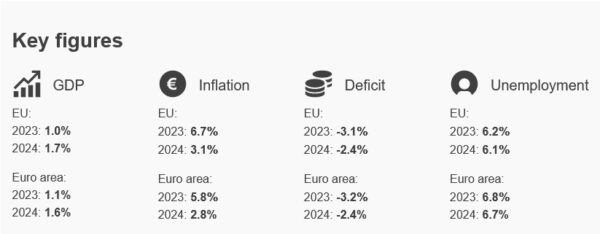In its Spring 2023 Economic Forecast, European Commission presented a cautiously optimistic outlook for the Eurozone, with GDP growth projections revised upwards to 1.1% and 1.6% for 2023 and 2024 respectively. This positive adjustment, credited to a stronger-than-expected start to the year, exceeds winter forecasts of 0.9% in 2023 and 1.5% in 2024.
However, the report did not shy away from the challenges posed by inflation. Persisting core price pressures have led the Commission to revise its inflation forecasts for Eurozone to 5.8% in 2023 and 2.8% in 2024, up from winter’s projected 5.6% and 2.5% respectively. On an annual basis, core inflation is set to average 6.1% in 2023 before falling to 3.2% in 2024, remaining above headline inflation in both forecast years.
While the overall picture painted by the Commission is one of steady recovery, it also acknowledges increase in downside risks to economic outlook. The report warned that persistent core inflation could continue to squeeze household purchasing power and necessitate stronger response from monetary policy, leading to wider macro-financial implications.
Potential threats also include renewed financial stress, which could trigger tightening of lending standards, and exacerbation of inflation by expansionary fiscal policies.
The forecast also flagged the ongoing turmoil in the banking sector and broader geopolitical tensions as possible sources of further economic challenges. On the other hand, the Commission noted that more favorable developments in energy prices could lead to a faster decline in headline inflation, boosting domestic demand.

